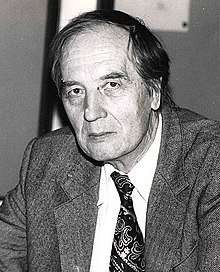Boris Kochelaev
Boris Ivanovich Kochelaev (Russian: Бори́с Ива́нович Кочела́ев; born April 19, 1934) is a Soviet and Russian physicist, professor, Doktor Nauk.
Boris Kochelaev | |
|---|---|
 | |
| Born | April 19, 1934 |
| Nationality | Russian |
| Alma mater | Kazan Federal University |
| Awards | Order of the Red Banner of Labour (1976) Order of Honour (2005) |
| Scientific career | |
| Fields | Physics |
| Institutions | Kazan Federal University |
| Doctoral advisor | Semen Altshuler |
Biography
Kochelaev was born in Dirizhablstroy (now Dolgoprudny), USSR. He graduated from the Physics and Mathematics Faculty of the Kazan University in 1957. From 1957 to 1960 Kochelaev was a post-graduate student of the Experimental and Theoretical Physics Department of Kazan University under the supervision of Semen Altshuler. He defended his candidate's (Ph.D.) dissertation in 1960 in Kharkov State University, and his doctor's dissertation in 1968. From 1968 until now Boris Kochelaev is a professor and from 1973 to 2000 is a chair of Kazan University's Theoretical Physics Department.
He is an author of more than 150 scientific works. 33 PhD-level scientists were supervised by Kochelaev, 10 of them have obtained the Doctoral degrees and become full professors.
Research
The research interests are focused on electron spin resonance and spin dynamics in condensed matter, superconductivity, propagation of the sound in resonant media, and light scattering in solids.
Major research achievements:
- The development of spin-phonon interactions in paramagnetic crystals:[1] [2]
- The non-linear theory of kinetic processes in paramagnetic crystals explained the experimentally observed phonon avalanche and super-scattering of light under saturation on the wing of the EPR line[3] [4]
- The prediction of the discovered later effect of non-resonant sound absorption and its giant amplification by radio-frequency fields
- The theory of EPR and spin relaxation in conventional superconductors with paramagnetic impurities [5][6][7]
- The theory of spin kinetics and magnetic resonance in usual and high-Tc superconductors[8][9] and Kondo systems with heavy fermions[10].
These last theoretical investigations are best described by the Nobel Prize winner Prof. K. Alex Müller in the paper titled "The Impact of ESR (EPR) on the Understanding of the Cuprates and Their Superconductivity":
this important advance was achieved by the experimental results at the universities of Darmstadt and Zürich on the one side and the deep theoretical insight of Boris Kochelaev at the Kazan State University explaining them on the other side.[11]
Honors and awards
- Medal "For the Development of Virgin Lands" (1958)
- Order of the Red Banner of Labour (1976)
- Medal "Veteran of Labour" (1983)
- Honored Worker of Science of TASSR (1984)
- Honored Worker of Science of Russian Federation (2000)
- Honored Professor of Kazan University (2004)
- Order of Honour (Russia) (2005)
- State Prize of the Republic of Tatarstan in the field of science and technology (2007)
- Order Order «For Merit to the Republic of Tatarstan» (2015)
References
- Contribution to the Theory of Spin-Lattice Relaxation of Nuclear Spins in Ionic Crystals B.I. Kochelaev ZhETF, 37, 242 (1959)
- Spin-Spin Interaction via a Phonon Field in Paramagnetic Crystals L.K. Aminov, B.I. Kochelaev ZhETF, 42, 1303 (1962)
- B.I. Kochelaev, Yu.G. Nazarov and A.Kh. Khasanov. A light superscattering by the paramagnetic ions spin system Pis’ma ZhETF, 33, 475 (1983)
- Spin-Spin Interaction via a Phonon Field in Paramagnetic Crystals L.K. Aminov, B.I. Kochelaev ZhETF, 42, 1303 (1962)
- N.E. Alekseevskii, I.A. Garifullin, B.I. Kochelaev and E.G. Kharakhashyan. Electron paramagnetic resonance on localized magnetic states in a superconducting system La-Er. ZhETF, 72, 1523 (1977)
- A.A. Kosov and B.I. Kochelaev. Electron paramagnetic resonance of localized magnetic moments in non-gap superconductors. ZhETF, 74, 14 (1978)
- B.I. Kochelaev, L.R. Tagirov, M.G. Khusainov. Space dispersion of a spin susceptibility of conduction electrons in a superconductor. ZhETF, 76, 578 (1979)
- A. Shengelaya, Guo-meng Zhao, H. Keller, K.-A. Müller, B.I. Kochelaev. EPR in La1-xCaxMnO3: Relaxation and bottleneck. Phys. Rev. B 61, 5888 (2000)
- A. Shengelaya, M. Bruun, B.I. Kochelaev, A. Safina, K. Conder, K.-A. Müller. Metallic phase in lightly doped La2-xSrxCuO4 observed by electron paramagnetic resonance. Phys. Rev. Lett. 93, 01 7001 (2004)
- Why could electron spin resonance be observed in a heavy fermion Kondo lattice? Eur. Phys. J. B. 72, 485 (2009)
- EPR newsletter, vol.22, no.1, 5-6 (2012)